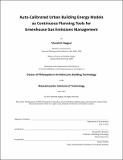Auto-calibrated urban building energy models as continuous planning tools for greenhouse gas emissions management
Author(s)
Nagpal, Shreshth.
Download1135800592-MIT.pdf (3.341Mb)
Other Contributors
Massachusetts Institute of Technology. Department of Architecture.
Advisor
Christoph F. Reinhart.
Christoph F. Reinhart.
Terms of use
Metadata
Show full item recordAbstract
To reduce greenhouse gas emissions associated with their buildings' energy use, owners frequently rely on building energy models that are calibrated to existing conditions for evaluation of potential energy efficiency retrofits. Development of such calibrated models requires the estimation of a series of building characteristics, a process which is extremely effort-intensive even for a single building and, therefore, almost prohibitive for large campus projects which often include hundreds of diverse-use buildings. There is a need for a framework that combines established urban energy model generation techniques with data-driven methods to reduce the manual and computational cost of developing calibrated baseline campus energy models, allow for real time evaluation of future building upgrades, and display their consequences to decision makers on an ongoing basis. This dissertation addresses this need by proposing new workflows for different development stages of models designed to evaluate future energy scenarios for large institutional campuses. First, the strengths and limitations of different urban modeling methodologies are assessed (modeling approach). Next, a methodology to employ statistical surrogate models is proposed for rapid estimation of unknown building properties (auto-calibration). Finally, a continuous energy performance tracking framework is presented to enable university campuses to manage their building related greenhouse gas emissions over time (continuous planning). As a proof of concept, the complete method has been implemented and tested at the author's home institution. Auto-calibration and continuous planning can be implemented independently or combined, and the dissertation includes a discussion about their possible impact if applied across the building stock.
Description
This electronic version was submitted by the student author. The certified thesis is available in the Institute Archives and Special Collections. Thesis: Ph. D. in Architecture: Building Technology, Massachusetts Institute of Technology, Department of Architecture, 2019 Cataloged from PDF version of thesis. Includes bibliographical references (pages 109-117).
Date issued
2019Department
Massachusetts Institute of Technology. Department of ArchitecturePublisher
Massachusetts Institute of Technology
Keywords
Architecture.